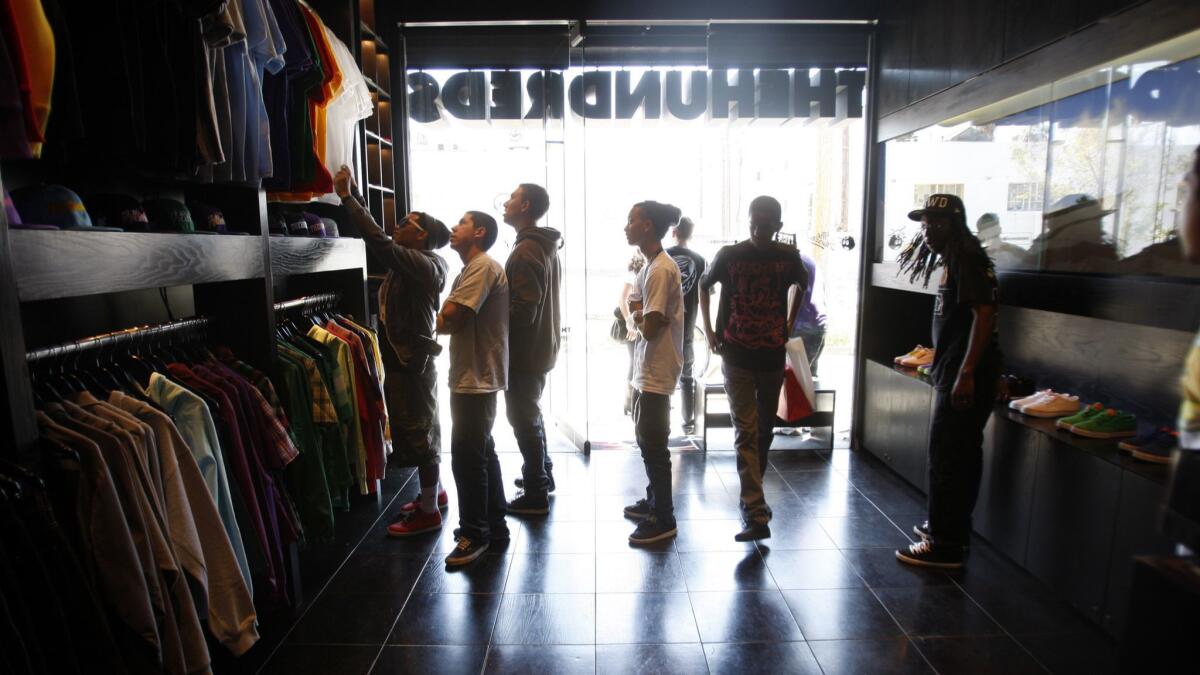Review:: Bobby Hundreds’ memoir is a snapshot of L.A.’s streetwear culture of the 2000s
- Share via
The title of Bobby Hundreds’ book — “This Is Not a T-Shirt” — is straight-up transparent: It’s not a T-shirt. It’s less obvious at the outset — but not for long — that it’s also not a traditional memoir, brand history or “how-we-turned-a couple-hundred bucks-into-global-streetwear-label” success story either — though those are all in the mix.
Hundreds’ real name is Bobby Kim, and his fast-paced book is an L.A.-centric roller-coaster ride; part streetwear explainer, part window into growing up Asian American in 1980s Riverside, Calif. The book also serves as a shout-out to the myriad mentors who’ve contributed to the success of the Hundreds streetwear brand cofounded by Kim and Ben Shenassafar (a.k.a. Ben Hundreds) in 2003 — and occasionally a score-settling stick poked at the haters they’ve met along the way. At turns poignant and laugh-out-loud funny, it’s sprinkled liberally with both business aphorisms (“People over product,” “Passion begets passion”) and observational humor (“Kenny rolled his eyes harder than a Kit-Cat Klock”).
Fans of the brand will no doubt enjoy “T-Shirt” for its origin-story arc; recounting details both big (how the founders met — at Loyola Law School) and small (how the bricks-and-mortar store off Fairfax Avenue was funded by a particularly popular paisley hoodie). Kim also recalls standing outside their trade-show booths where journalists and buyers would try to understand their brand. They would ask, “Are you hip-hop or action sports?,’” Kim writes. “Translation: ‘Are you for black kids or white kids?’ Ben and I would look at each other. He, of Iranian Jewish descent. Me, a Korean American kid who grew up thinking I was Latino. ‘Neither,’ We’d respond.”

But Kim’s colorful turns of phrase — “I’m the most gregarious misanthrope you’ll ever meet, like Larry David on Molly,” he writes at one point; elsewhere in the book, he describes the nascent brand as “a ghetto-rigged, two-bit science project, a couple wires short of a potato battery” — and the book’s nonlinear, tension-building structure make it enjoyable even if you’re not familiar with the brand.
While “This Is Not a T-shirt” is a near-encyclopedic deep dive into the world of streetwear by one of the OG movers and shakers of L.A.’s scene, it’s also a frozen-in-amber snapshot of brand-building, blogging and living in the pre-social media era.
“Defining streetwear is like fencing a mirage,” Kim writes (in the chapter appropriately titled “Streetwear: A Brief History”), “the tighter you crop in, the less focused the picture becomes.” Instead, he explains — in great detail — how the Hundreds came to crawl out of the primordial ooze of trade shows and stores of the mid-2000s that had been compartmentalizing young men’s fashion into skate and urban (and, where the two intersected, the “embarrassing portmanteau ‘skurban’’’).
“Skaters became disenfranchised by organized action sports and wanted something more grounded, rootsy and fashionable to wear,” he says. “The burgeoning retro sneaker culture needed to be dressed from the ankles up. All of these factors converged on an industry, a movement, that required a catchphrase. Moreover, this new customer — young, mostly male and preoccupied with fashion — sought a flag to brandish. ‘Streetwear’ fit just right.”
For Kim, an aspiring artist rolling into Los Angeles in the social media pre-history of 2001, just as the subculture was getting ready to move mainstream, the graphic-print T-shirt represented a way to share his artwork with the world.
“Streetwear, as a medium, is established on the graphic T-shirt,” he writes. “For one, the profit margins are unbeatable when you’re cranking out tees for $5 a pop and flipping them for $35. On the spiritual level, however, the T-shirt is effective because it’s about messaging. … To this day, that’s my primary rule when it comes to designing T-shirts: have something to say.”
The first order shipped to a bricks-and-mortar retailer — a dozen shirts to Fred Segal Santa Monica in summer 2003 – had thehundreds.com web address printed on the clear vinyl bags holding each shirt. “I wanted the customers to understand that they weren’t just buying a T-shirt,” he recounts. “The clothes unlocked a story. There was an entire universe attached to each T-shirt that I was blogging about on the site.”

That, in essence, is the gist of the book. For the Hundreds, the T-shirt was never just a cotton garment with a good profit margin. It was also a billboard, a megaphone, a business card, an art portfolio, a community-builder, a rallying cry. It signified a meaningful connection with like-minded souls. (The title is also a nod to an unlicensed “This Is Not a Fugazi T-shirt” shirt mentioned in the book, which Kim calls “one of the most iconic T-shirts in music history.”)
Imbuing a T-shirt with that kind of meaning — especially in an era when anyone with two bars on a cellphone can custom print a T-shirt with a few swipes — probably comes off as quaint. But Kim weaves so much of his personal history into the tendrils of the story that when he gets around to making the case, it makes sense. It’s made all the more believable, of course, because the Hundreds is still around — and thriving — today.
Kim is open that the Hundreds success story has not been a straight line. By including the low points (consuming a dusty can of Spam after two days of not eating) along with the highs (buying a DeLorean) and earnestly recounting some of the harder decisions — like closing retail stores or having to decide whether or not to sell into mall stores (he cites the fight he had with cofounder Shenassafar over the latter as among the most bruising he can recall), he provides valuable business guidance beyond the quotable quotes.
Like the humble graphic-print streetwear T-shirt upon which the Hundreds is built, “This Is Not a T-Shirt” is more than just one thing, it’s many things. And, given Kim’s skill as a storyteller, we wouldn’t be surprised if it eventually became one more thing too: a screenplay.
::
“This Is Not a T-Shirt: A Brand, a Culture, a Community — a Life in Streetwear”
Bobby Hundreds
MCD; 326 pp., $28
For more musings on all things fashion and style, follow me at @ARTschorn
More to Read
Sign up for our Book Club newsletter
Get the latest news, events and more from the Los Angeles Times Book Club, and help us get L.A. reading and talking.
You may occasionally receive promotional content from the Los Angeles Times.







